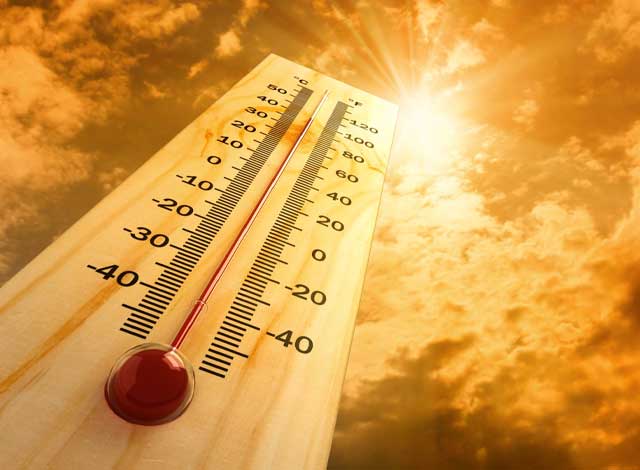It’s hot out there! The Health Unit would like to remind everyone to take care during times of high temperatures and high humidity. Environment and Climate Change Canada has issued a heat warning for our Health Unit area. Temperatures today and Tuesday will soar to the low thirties. Warm temperatures are expected both tonight and Tuesday night with temperatures only dropping into the low twenties overnight. Afternoon humidex values will also reach 40 in many areas on both days. The heat may last into mid-week.
Heat warnings are issues when:
- Daytime temperature of 31ºC or higher and nighttime temperature not cooler than 20ºC for at least two days, or
- Humidex of 40ºC for at least two days
High heat can be hazardous to your health. Conditions during high heat and humidity have the potential to cause dehydration, heat exhaustion, heat stroke and in some cases death.
Dr. Paula Stewart, Medical Officer of Health for the Leeds, Grenville and Lanark District Health Unit, would like to remind the public that during a high heat event it is important to keep cool, hydrated and to take the following precautions:
- Do not leave children, adults or pets in parked cars or sleeping outside in direct sunlight.
- Consult your doctor or pharmacist regarding the side effects of your medications.
- Drink plenty of water throughout the day, even if you don’t feel very thirsty. Remember to take sips often and not to guzzle your drink. Learn more about hydration at unlockfood.ca.
- Eat foods that have high water content such as watermelon, grapes and oranges.
- Limit caffeinated beverages such as coffee and cola.
- Avoid going out in the blazing sun or heat. If you must go outside, stay in the shade as much as possible.
- Take a cool bath or shower periodically or cool down with cool, wet towels.
- Whenever possible go to an air-conditioned room or building.
- Wear loose fitting, light clothing and a wide-brimmed hat when outdoors.
- Keep window shades or drapes drawn and blinds closed on the sunny side of your home.
- Keep electric lights off or turned down low.
- Visit a local splash pad.
- Visit a local pool or beach – A list of beaches sampled are on our website along with the most recent water sample results.
- If you can, eat a variety of foods that can be prepared safely without using the oven.
- Don’t skip meals, instead eat smaller amounts more often. Use Canada’s New Food Guide. Check out the snacks on this page.
- Use fans to draw cool air at night, but do not rely on a fan as a main cooling device during long periods of high heat and humidity.
- Reduce the use of personal vehicles, stop unnecessary idling; avoid using oil-based paints and glues, pesticides and gas-powered small engines.
Everyone is at risk; however the following are in greater danger of being affected:
- elderly
- people with chronic illness or who take certain medications
- infants and preschool children
- people who have challenges with housing and shelter
- people who participate in physical activity or are involved in strenuous outdoor work for prolonged period
During a Heat Warning, the public is strongly encouraged to check on a neighbour or a friend who may have a greater risk of suffering negative health consequences from the heat and humidity.
- Even short periods of exposure to high temperatures can cause health problems. If you experience the following symptoms after exposure to extreme heat seek medical attention immediately:
- Nausea, dizziness, blurred vision
- Difficulty or rapid breathing
- Severe headache or confusion
- Convulsion
- Fever
For more information on how to protect your health during extreme heat, visit our Exposure to Hot/Cold Temperatures page. For specific health heat-related questions call 1-800-660-5853 or 613-345-5685. You can also connect with us on Facebook, Twitter @LGLHealthUnit or Instagram @lglhealthunit.z for important public health updates.
Article submitted
